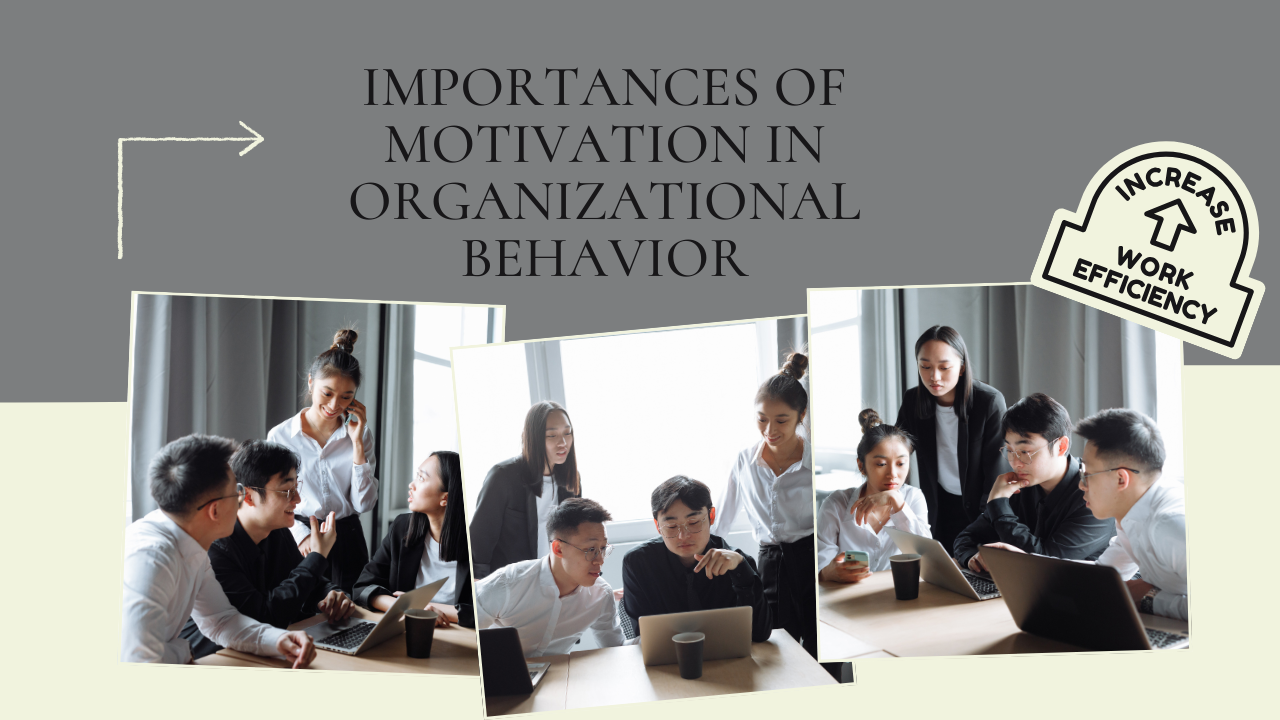Importance of Motivation in Organizational behavior
Motivation is what motivates people to work and perform well. In the workplace, motivation is important because it affects how hard employees work, how happy they are, and how well they achieve their goals. When employees are motivated, they put in more effort, stay with the company longer, and are more open to changes. Understanding the importance of motivation helps organizations create a positive and productive work environment.
Table of Contents
Importance of motivation
1. Motivation Increases performance
Motivation acts like fuel for people to perform better. When employees are motivated, they put in more effort, work harder and achieve higher levels of productivity. This means they can complete tasks more efficiently and with better quality. Imagine you have a goal you are excited about; you will naturally work harder to achieve it. Likewise, motivated employees are more motivated to succeed and accomplish their goals.
Example: Imagine a teacher who always praises and encourages students when they do well. Because students feel good about their accomplishments, they work harder and perform better in their studies. Similarly, in a company, employees who receive recognition and encouragement from their boss will work harder and achieve better results.
2. Motivation Reduces turnover and absenteeism
When employees are motivated, they feel satisfied and happy with their jobs. This means they are less likely to leave the company or take unnecessary days off. High turnover (when employees frequently leave the company) and absenteeism (when employees are frequently absent) can be very costly and disruptive to any organization. Motivated employees enjoy their work and feel valued, so they stay longer and are more reliable, which reduces these problems.
Example: Consider a factory where workers are given bonuses for good attendance and performance. These motivated workers are more likely to come to work regularly and stay with the company longer. If the factory did not have these bonuses, workers might take more days off or look for jobs elsewhere.
3. Motivation helps managers to easily introduce changes without any resistance
Change can be difficult in any organization, and people often resist it. However, when employees are motivated, they trust their managers more and are open to new ideas. Motivated employees understand that changes can lead to better opportunities and improvements. Therefore, when managers need to make changes, motivated employees are more likely to support and adopt these changes rather than resist them.
Example: Think of a restaurant where the manager wants to change the menu. If the employees are motivated and trust the manager, they will be more open to try new dishes and learn new recipes. If employees were not motivated, they might resist changes and complain about learning new things.
4. Motivation Improves organizational image
An organization known for motivated and happy employees builds a positive reputation. People want to work for companies where employees are treated well and feel motivated. This can attract top talent and make the company look good to clients, customers, and the general public. A good image can lead to more business opportunities and a stronger market position.
Example: Imagine a tech company that is known for its innovative products and happy employees. People talk positively about the company on social media and in the news. As a result, talented job seekers want to work there, and customers trust this company and prefer to buy from it because of its good reputation.
5. Motivation Improved industrial relations
Industrial relations refer to the relationship between the employer and employees. Good industrial relations mean there is mutual respect, trust and cooperation between the two. Motivated employees communicate better, work well with management and are more likely to resolve conflicts peacefully. This creates a harmonious workplace where both employers and employees are happy, leading to a more productive and positive environment.
Example: Imagine a large factory where employees and managers hold regular meetings to discuss any issues. Because employees are motivated and feel they are being listened to, they state their problems calmly, and managers listen to them and find solutions. This cooperation leads to a peaceful and productive workplace without strikes or conflict.
6. Motivation boosts creativity and innovation
Motivation encourages people to think of new and unique ideas. When a person is excited about his work, he is more likely to experiment and try different ways to solve problems or create something new. This leads to innovative solutions and new approaches.
Example: Think of a graphic designer who feels excited and motivated by their work. This designer is likely to come up with new creative ideas for their project. If they weren’t motivated, they might stick with old, boring designs. Motivation encourages people to think outside the box and come up with new, innovative solutions.
7. Motivation Improves employee morale
Employee morale refers to the overall attitude and satisfaction of employees towards their work. High morale means that employees are happy and positive about their work. Motivated employees have high morale, making them more enthusiastic and energetic in their work.
Example: Imagine a sales team that regularly receives incentives and rewards for meeting their goals. Team members feel appreciated and their morale stays high. This positive attitude makes them more enthusiastic and energetic in their work. High morale can spread throughout the workplace, creating a positive atmosphere for everyone.
8. Motivation boosts engagement
Engagement occurs when employees are fully involved in and interested in their work. Motivated employees pay more attention to their tasks and are more committed of doing a good job. This leads to better focus and productivity, because they care about their work and its results.
Example: Imagine a company where employees are given opportunities to participate in decision-making. Because they feel their opinions matter, they are more engaged and interested in their work. Motivated employees are less likely to be distracted or disengaged, leading to better focus and productivity.
9. Motivation Encourages personal growth
Personal growth is about improving skills and gaining new knowledge. Motivation motivates people to learn new things and develop their abilities. This means they seek out training and development opportunities, making them more efficient and valuable to their company.
Example: Consider a programmer who is motivated to learn new coding languages. This motivation leads them to take courses and improve their skills. As a result, they become more knowledgeable and valuable to the company. Motivation helps individuals achieve personal growth and career advancement.
10. Motivation Strengthens teamwork
Teamwork means working together with others to achieve common goals. Motivated people are more likely to collaborate, share ideas, and support each other. This strengthens teamwork, as everyone works together effectively to achieve their objectives.
Example: Think of a sports team where each player is motivated to win. They support and encourage each other as they work together to achieve their goal. In the workplace, motivated employees collaborate better, share ideas and help each other, leading to stronger teamwork and better results.
11. Motivation Increases confidence
Confidence means believing in your own abilities. Motivation helps people feel more confident about themselves, making them more willing to take on challenges. Motivated individuals trust their skills and are more likely to tackle difficult tasks with a positive attitude.
Example: Imagine a public speaker who receives positive feedback and motivation from their audience. This encouragement boosts their confidence, making them more effective in their presentations. Likewise, motivated employees believe in their abilities and approach challenges with confidence.
12. Motivation Helps make better decisions
Decision making means choosing the best course of action. Motivated people take the time to think carefully and gather information before making decisions. This leads to better, more thoughtful decisions that benefit the company and its goals.
Example: Consider a manager who is motivated to improve company performance. They spend time analyzing data, seeking input from their team, and making informed decisions. Motivated individuals are more likely to put effort into making thoughtful, well-considered decisions.
13. Motivation Promotes loyalty
Loyalty is a strong feeling of support and commitment toward someone or something. Motivated employees feel loyal to their company and are less likely to leave the company for another job. This commitment means they are dedicated to the company’s success and work hard to contribute to it.
Example: Imagine a small business where the owner treats employees with respect and recognizes their hard work. Employees feel a strong sense of loyalty to the owner and the business. This loyalty means they are committed to the company’s success and are less likely to leave for another job.
14. Motivation Reduces stress and anxiety
Stress and anxiety are feelings of worry and tension. Motivated people feel a sense of purpose and accomplishment, which helps reduce these negative feelings. When employees are motivated, they enjoy their work more and feel less overwhelmed or anxious about their tasks.
Example: Think of an office where employees are motivated and enjoy their work. They feel a sense of purpose and accomplishment, which reduces their stress levels. Motivated employees are less likely to feel overwhelmed or anxious about their tasks.
15. Motivation Creates a positive work culture
Work culture is the atmosphere and attitude within a workplace. A positive work culture means that employees feel valued, supported, and motivated. This creates a happy and productive workplace where everyone feels good about coming to work and contributing their best.
Example: Imagine a company that regularly celebrates achievements and encourages employees to support each other. This creates a positive work culture where everyone feels valued and motivated. A positive work culture attracts talent and keeps employees happy and productive.
Frequently Asked Questions on the Importance of Motivation
What is motivation?
Why is motivation important in the workplace?
Conclusion of Importance of Motivation
In Conclusion, motivation is the key to a successful and happy workplace. It boosts performance, reduces turnover and absenteeism, and helps managers implement changes smoothly. Motivated employees improve the company’s image, enhance teamwork, and promote personal growth. They are also more creative, confident, and engaged in their work. By fostering motivation, companies can create a positive work culture, reduce stress, and build loyalty among their employees. Investing in motivation creates a thriving and productive organization where everyone feels valued and inspired to do their best.








The articles you write help me a lot and I like the topic
Thank you for your help and this post. It’s been great.
Thank you for writing this article. I appreciate the subject too.
Thank you for your sharing. I am worried that I lack creative ideas. It is your article that makes me full of hope. Thank you. But, I have a question, can you help me?
Your point of view caught my eye and was very interesting. Thanks. I have a question for you. https://www.binance.com/kz/register?ref=RQUR4BEO
Thank you for your sharing. I am worried that I lack creative ideas. It is your article that makes me full of hope. Thank you. But, I have a question, can you help me?
Your point of view caught my eye and was very interesting. Thanks. I have a question for you. Kayit Ol